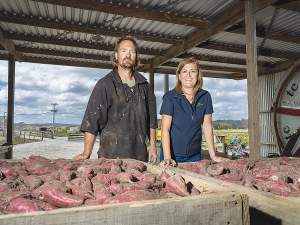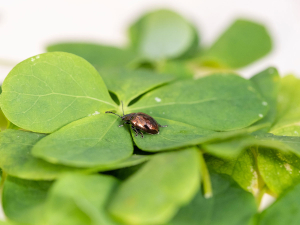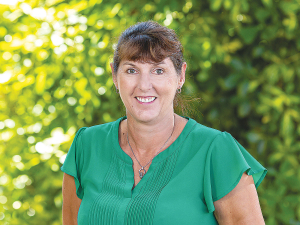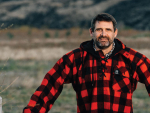With Northland's kumara industry back on track after the devastation of Cyclone Gabrielle, one Kaipara farming couple have a simple message for those who helped: "thank you".
Like many growers in the region, James and Krista Franklin's property near Dargaville was hit hard by Gabrielle after the Kaihu River burst its banks in February last year.
"We were warned about storm coming, but never did we expect the devastation that Cyclone Gabrielle dealt to us," Krista said.
After a night of very heavy rain, the couple woke to find the field across the road had turned into a lake, and knew they were in trouble. They took their two young girls to James' parents' home and after driving his family to safety, James returned to the farm to try to save what he could.
While the couple's home was fortunately spared due to being built up on piles, hectares of kumara were completely underwater.
In the days that followed, the pair endured a nervous wait. The longer the water sat on their fields, the greater the damage was likely to be.
Some exploratory digs confirmed their worst fears - most of the kumara had started to rot and, in the end, they were only able to harvest 16% of their total crop.
The most agonising part was that the cyclone hit only a few days before the date they had planned to harvest.
"We had, like many other growers, decided to leave it a couple of weeks to size the crop up," Krista said.
"Hindsight's a wonderful thing it was probably the worst mistake we've made in our lives."
The physical and financial damage was so bad that the couple seriously considered leaving the business.
"But in the end, we decided that we'd kick ourselves if we didn't try again," Krista said.
As James and Krista faced the daunting task of cleaning up and starting over, Krista said they realised, more than ever, the importance of mental wellbeing, including taking time to get off the farm to unwind.
“It’s a very lonely place when you’re not sure where to turn,” she said.
Rural Support Trust Northland Chair Michelle Ruddell said, in the aftermath of Gabrielle, the trust organised a wide variety of support initiatives to help farmers like James and Krista.
“The initial impact on farmers was incredibly stressful,” Michelle said.
“Kumara growers had lost upward of 70 per cent of their crops, but initially no one knew just what the damage was – people were shell shocked.
“The ongoing rain had a more insidious impact on people. The weather ground people down.
“Rural Support is here to create opportunities for our farmers and growers to get off-farm, connect with other farmers and growers, to realise they are not alone.”
Michelle said Rural Support Trust Northland organised 100 events supporting farmers in 2023, with 5500 people attending, and facilitated the clean-up of 135 farms.
The number of one-on- one support clients being helped by the trust increased from 45 before Gabrielle, to 145 afterwards.
Care packages were sent out to 960 farmers, which included $1,000 Countdown vouchers to enable them to hold end-of- harvest events with their teams.
Funding Rural Support Trust
Rural Support Trust receives funding from a range of sources, including the Ministry for Primary Industries, private donations, and from corporates.
ANZ New Zealand was one such company, donating $100,000 to the trust’s Cyclone Gabrielle relief effort.
Michelle Ruddell says the funding went towards care packages for farmers and training trust staff and agri-sector professionals to better support the community, and recognise signs of distress.
“ANZ’s contribution made a genuine difference for our farmers and growers,” Michelle said.
Krista realised the impact Rural Support Trust had at times like these, and soon after Gabrielle hit, she decided to get involved herself.”


















